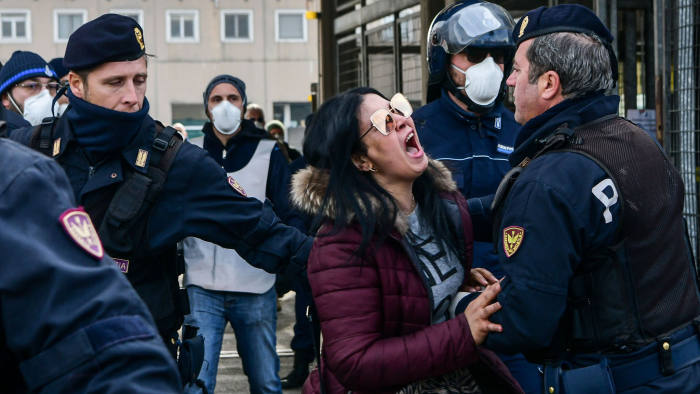
File photo
The growing impact of the novel coronavirus shows that all countries must resolutely work together to battle the pandemic amid globalization, with China having much to share through its success in fighting the disease, according to analysts.
While Chinese success and contributions in fighting COVID-19 have been recognized by the international community, the pandemic threat means that no one country can survive alone amid broader globalization challenges and trends, participants of a major online forum organized by leading think tank Center for China and Globalization agreed on Wednesday.
From medical expertise to equipment toward the anti-outbreak effort, "Chinese wisdom and experience is being manifested globally," said the forum's moderator Huang Rihan, executive director of the think tank's Belt and Road Institute.
"During this critical juncture, we need to discuss China's experience and how it can be tapped as a reference to fight COVID-19," Huang said.
The coronavirus outbreak, which first hit Central China's Hubei province in the runup to the new year, is proving to be a major public health threat in Europe, the United States and other parts of the West even as Chinese measures at containing the disease make headway. Chinese medical assistance and supplies have also been integral in helping other countries and regions fight the pandemic.
Chen Wenling, chief economist at the Beijing-based think tank China Center for International Economic Exchanges, said that the virus "respects no borders" and its impact is now set to be felt beyond public health to include the global economy and other sectors.
Differences in Eastern and Western cultures may also have fueled some tension in the approach and handling of the outbreak, which may have affected the "window of opportunity created by China" to help others fight COVID-19, she said.
Whether it was the ability to enforce effective lockdowns or the combination of traditional Chinese medicine and Western medical practices, China was able to draw on wide-ranging resources, Chen said.
Changed landscape
"We need to recognize that we share a common destiny as humans. This outbreak has changed our global political, economic and cultural landscape," she said.
The forum, which used the latest in teleconferencing technology as part of anti-outbreak and social distancing measures, drew more than 700,000 participants and viewers from across the globe.
Cui Hongjian, director of the Department for European Studies at the China Institute of International Studies, said that the pandemic will certainly be felt in terms of international relations and broader globalization trends.
In Europe itself, the outbreak has been handled to varying degrees and success in different countries, which will play out in areas such as regional integration and populist tendencies going forward, Cui said.
"There may also be an impact on European international relations and EU-US ties… with the EU travel bans issued by the Trump administration and recent US-German tensions in terms of COVID-19 vaccine research and development, related businesses and more. Such contradictions will be magnified in the current context and may further affect mutual trust between Europe and the United States," Cui said.
"At the same time, I think the focus of our cooperation with Europe in the next stage will also be on how we can promote economic recovery and better maintain industrial and supply chains. The economic, trade and investment links between China and the EU are very close, but the epidemic will pose a very big challenge to all of us," Cui said.
Ding Yifan, former deputy director and senior fellow of the Institute of World Development at the Development Research Center of the State Council, said COVID-19 has "changed the world for sure".
"We have done a good job in fighting the epidemic and greatly improved China's image," Ding said.
"China's ability in controlling the outbreak has been the envy of many. From the perspective of developing countries, it is truly remarkable," he said.
But any impact of China's efforts to help others fight the epidemic may also fuel a backlash about its rising influence, so the country will need to maintain a "stable, peaceful path in its approach", Ding said.
Lessons learned
Dong Zengjun, secretary-general of the Precision Medicine Professional Committee of the Chinese Society of Biotechnology, said that "the virus has taught us, in terms of globalization, that we have each other. Our perspective must be global, for mutual help and understanding".
"Some of our experiences have now been shared internationally … we also have many scientists and medical specialists sharing our experiences and lessons," he said.
"We are sharing with each other internationally. In outbreak prevention and control, we have blocked the transmission channels and checked the sources of infection."
Huang Yanzhong, senior fellow for global health at the US nonprofit think tank Council on Foreign Relations, said that in learning from China's experience, there must be the awareness that it has been able to draw on its comprehensive capabilities and mobilized its vast resources swiftly.
"Can the Chinese model be completely copied? We certainly see that China actually has a lot of experience worth emulating … but when studying the experience of China in this outbreak, we must also pay attention to the national conditions of each country," he said.
"We should seek a point where we can adapt and make adjustments to the epidemic situation and the actual political, economic, and social conditions."
Wang Yong, director of the Center for International Political Economy at Peking University, said that COVID-19 has laid bare the significant challenges facing all members of the global community, including those in governance, the economy, health and even climate change.
"Responding to the pandemic and controlling the virus requires international public health cooperation. The most important thing is to share experiences, remove prejudice and adopt a scientific approach suitable for each country's situation," Wang said.
"Establishing dialogue and mutual trust is key. We must maintain the trends of globalization and strengthen international cooperation."


